新概念第二册第一课教案 (1)
新概念2册第一课教案
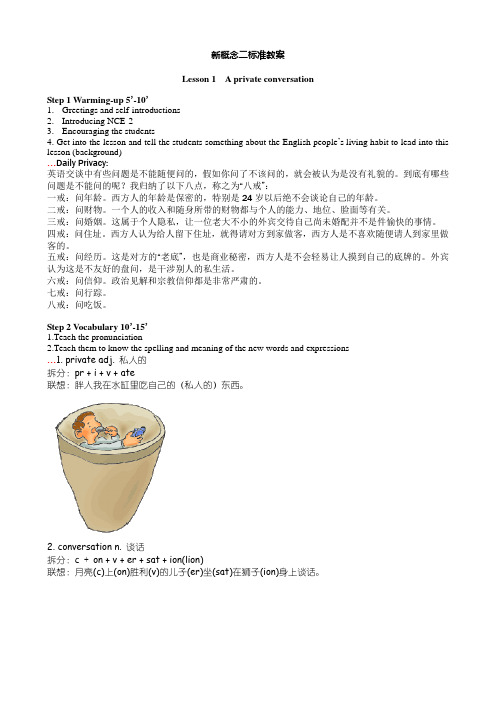
新概念二标准教案Lesson 1 A private conversationStep 1 Warming-up 5’-10’1.Greetings and self-introductions2.Introducing NCE-23.Encouraging the students4. Get into the lesson and tell the students something about the English people’s living habit to lead into this lesson (background)…Daily Privacy:英语交谈中有些问题是不能随便问的,假如你问了不该问的,就会被认为是没有礼貌的。
到底有哪些问题是不能问的呢?我归纳了以下八点,称之为“八戒”:一戒:问年龄。
西方人的年龄是保密的,特别是24岁以后绝不会谈论自己的年龄。
二戒:问财物。
一个人的收入和随身所带的财物都与个人的能力、地位、脸面等有关。
三戒:问婚姻。
这属于个人隐私,让一位老大不小的外宾交待自己尚未婚配并不是件愉快的事情。
四戒:问住址。
西方人认为给人留下住址,就得请对方到家做客,西方人是不喜欢随便请人到家里做客的。
五戒:问经历。
这是对方的“老底”,也是商业秘密,西方人是不会轻易让人摸到自己的底牌的。
外宾认为这是不友好的盘问,是干涉别人的私生活。
六戒:问信仰。
政治见解和宗教信仰都是非常严肃的。
七戒:问行踪。
八戒:问吃饭。
Step 2 Vocabulary 10’-15’1.Teach the pronunciation2.Teach them to know the spelling and meaning of the new words and expressions…1. private adj. 私人的拆分:pr + i + v + ate联想:胖人我在水缸里吃自己的(私人的)东西。
新概念英语第二册第一课详细教案
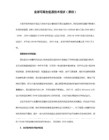
语一般为名词、代词或名词短语,通常位于动词之前。动词必须
“一致”,所以主语决定动词的单复数形式(如 I am, you are, he
。宾语一般为名词、代词或名词短语。在主动句中,宾语一般位
副词时,地点副词的一般位置是在方式副词
通常我们讲
be动词的适当形式填空。
2 / 7
Yesterday was______ the first of
All the students __are____ very excited.
______________________________________________
上教堂,去做礼拜 (cf.第1册第68课at school, at church;
1册第85课have been to school/church)
座位很好
一般指戏院、汽车等配置的固定座位,也可以抽象地表示“座位”
汽车的前座
请坐。
戏很有意思。
属于现在分词形式的形容词,意思是“使人感兴趣”。
fall sick。
4 / 7
上星期我去看戏。
句首的“Last week”点明叙述的事情发生的时间是上星期。因此整
(包括过去进行时),直接引语部分的
动词go的原义是离开一个地方去另一个地方,与介词to连用后,
请注意在以下的短语中名词前通常不加冠词:
上学
上床睡觉
1 / 7
:
( he, she, it,
,动词的词尾要加-S。(一般的动词词尾+S。以sh/ch/s/x结尾的
+es.以辅音字母Y结尾的把Y变成i,+es。辅音字母+o结尾的+es.)
教案新概念英语第二册标准教案第一课
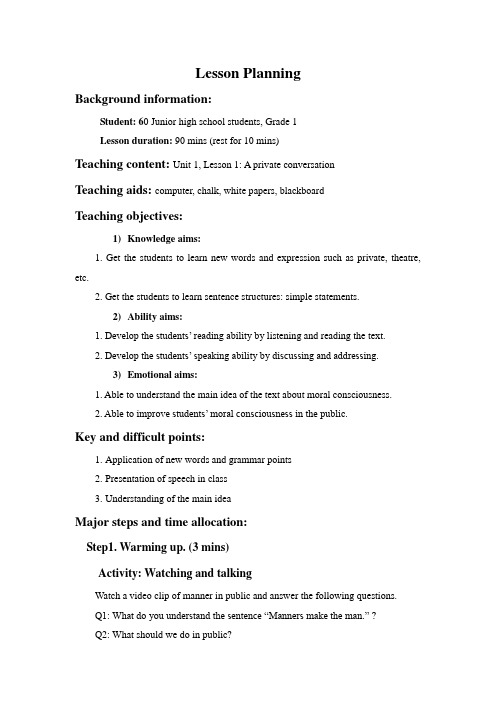
Lesson PlanningBackground information:Student: 60 Junior high school students, Grade 1Lesson duration: 90 mins (rest for 10 mins)Teaching content: Unit 1, Lesson 1: A private conversationTeaching aids: computer, chalk, white papers, blackboardTeaching objectives:1)Knowledge aims:1. Get the students to learn new words and expression such as private, theatre, etc.2. Get the students to learn sentence structures: simple statements.2)Ability aims:1. Develop the students’ reading ability by l istening and reading the text.2. Develop the students’ speaking ability by discussing and addressing.3)Emotional aims:1. Able to understand the main idea of the text about moral consciousness.2. Able to improve students’ moral consciousness in the publi c.Key and difficult points:1.Application of new words and grammar points2.Presentation of speech in class3.Understanding of the main ideaMajor steps and time allocation:Step1. Warming up. (3 mins)Activity: Watching and talkingWatch a video clip of manner in public and answer the following questions.Q1: What do you understand the sentence “Manners make the man.” ?Q2: What should we do in public?Step2. Pre-reading. (3 mins)Activity: Listening.Listen to the tape and then answer the question.Q: Why did the writer complain to the people behind him?Step3. While-reading. (10 mins)Activity 1: Skimming. (4 mins)Read the whole text and answer the following questions.Q1: What is the writing style of the text, narrative writing or descriptive writing?Q2: What is the general idea of the text?Activity 2: Scanning. (6 mins)Scan the text and complete the following tabulation.6 1 2 3 4 5 6When? Who?which?what? Action Who?which?what?How? Where? When?Last week I went to thetheatreI had a verygood seatThe play was veryinterestingI did notenjoythe playA young man and a young womanweresittingbehindmeThey weretalkingloudlyActivity 3: Close reading. (24 mins)1)Vocabulary and phrase.private adj.私人的conversation n.对话theatre n.戏院attention n.注意bear v.容忍turn round 转身pay attention注意none of your business不关你的事2)Sentence structures.1.Simple statements: A statement that tells us about one thing is a simple statement.2.Word order of simple statements: The order of words in a statement can affect the meaning of the statement.3)The tense.1.the past tense2.past continuous tense3.the present tense4)Main idea .Summarize the main idea of this text: Good manners in public are very important.Have a short break. (10 mins)Step4. Post-reading. (38 mins)Activity1. Make a short speech. (15 mins)Make a short speech about manners in public according to the following key words:speak loudly, rudely, knock at the door, spit, smoke, lady first...Activity2. Group work. (10 mins)Discuss with your partner “What did you do yesterday after school?”Use the simple statement to express your idea with right tense.Activity3. Exercise. (13 mins)Do exercise B on your textbook and then we will check it.Homework. (2mins)Finish the rest of exercises on your textbook and preview the next text.。
新概念英语第二册优秀教案
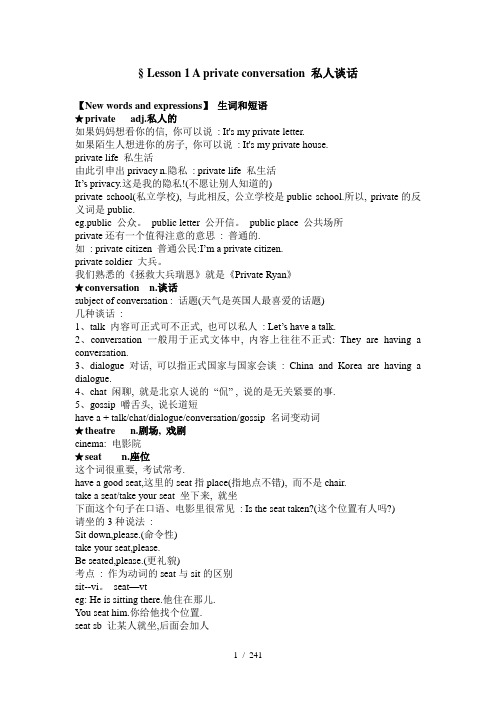
§ Lesson 1 A private conversation 私人谈话【New words and expressions】生词和短语★private adj.私人的如果妈妈想看你的信, 你可以说: It's my private letter.如果陌生人想进你的房子, 你可以说: It's my private house.private life 私生活由此引申出privacy n.隐私: private life 私生活It’s privacy.这是我的隐私!(不愿让别人知道的)private school(私立学校), 与此相反, 公立学校是public school.所以, private的反义词是public.eg.public 公众。
public letter 公开信。
public place 公共场所private还有一个值得注意的意思: 普通的.如: private citizen 普通公民:I’m a private citizen.private soldier 大兵。
我们熟悉的《拯救大兵瑞恩》就是《Private Ryan》★conversation n.谈话subject of conversation : 话题(天气是英国人最喜爱的话题)几种谈话:1、talk 内容可正式可不正式, 也可以私人: Let’s have a talk.2、conversation 一般用于正式文体中, 内容上往往不正式: They are having a conversation.3、dialogue 对话, 可以指正式国家与国家会谈: China and Korea are having a dialogue.4、chat 闲聊, 就是北京人说的“侃” , 说的是无关紧要的事.5、gossip 嚼舌头, 说长道短have a + talk/chat/dialogue/conversation/gossip 名词变动词★theatre n.剧场, 戏剧cinema: 电影院★seat n.座位这个词很重要, 考试常考.have a good seat,这里的seat指place(指地点不错), 而不是chair.take a seat/take your seat 坐下来, 就坐下面这个句子在口语、电影里很常见: Is the seat taken?(这个位置有人吗?)请坐的3种说法:Sit down,please.(命令性)take your seat,please.Be seated,please.(更礼貌)考点: 作为动词的seat与sit的区别sit--vi。
新概念第二册第一课教案
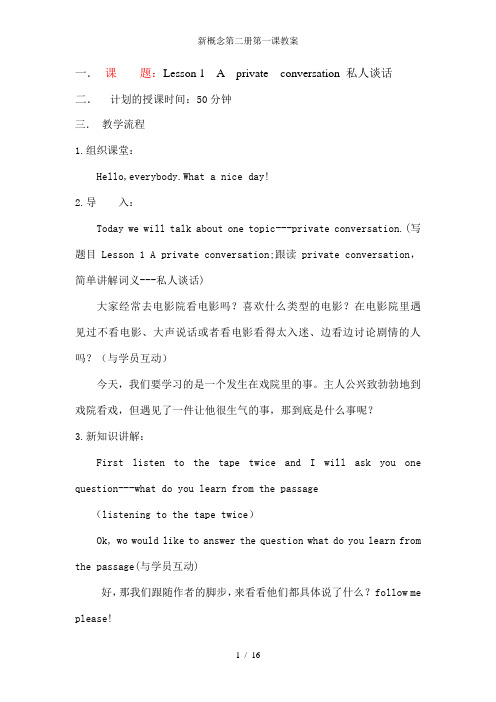
一.课题:Lesson 1 A private conversation 私人谈话二.计划的授课时间:50分钟三.教学流程1.组织课堂:Hello,everybody.What a nice day!2.导入:Today we will talk about one topic---private conversation.(写题目Lesson 1 A private conversation;跟读private conversation,简单讲解词义---私人谈话)大家经常去电影院看电影吗?喜欢什么类型的电影?在电影院里遇见过不看电影、大声说话或者看电影看得太入迷、边看边讨论剧情的人吗?(与学员互动)今天,我们要学习的是一个发生在戏院里的事。
主人公兴致勃勃地到戏院看戏,但遇见了一件让他很生气的事,那到底是什么事呢?3.新知识讲解:First listen to the tape twice and I will ask you one question---what do you learn from the passage(listening to the tape twice)Ok, wo would like to answer the question what do you learn from the passage(与学员互动)好,那我们跟随作者的脚步,来看看他们都具体说了什么?follow me please!(Read the passage following me and read it by the students themselves)生词与短语讲解:1.private/`praivit/adj.○1私人的,秘密的a private conversation/letter 私人交谈/信函Eg: they were sharing a private joke.他们讲着外人听不懂的笑话。
新概念第二册第一课教案

新概念第二册第一课教案教案标题:《新概念第二册第一课教案》教案目标:1. 通过本课的教学,学生能够掌握并正确运用本课所涉及的词汇和语法知识。
2. 培养学生的听、说、读、写能力,提高他们的英语综合运用能力。
3. 培养学生的合作意识和团队精神,通过小组活动促进学生之间的互动与合作。
教学重点:1. 通过听力训练,学生能够理解并正确运用本课所涉及的词汇和语法知识。
2. 通过口语训练,学生能够流利地表达自己的观点和意见。
3. 通过阅读训练,学生能够理解并运用本课所涉及的词汇和语法知识。
4. 通过写作训练,学生能够独立撰写一篇关于自己的家庭的短文。
教学准备:1. 课件、录音机、幻灯片等教学辅助工具。
2. 学生练习册、课本及相关教材。
3. 学生小组活动所需的材料。
教学过程:Step 1: 导入 (5分钟)1. 利用图片或实物引入本课话题,激发学生的学习兴趣。
2. 利用问题导入,如“你家有几口人?你们都住在一起吗?请介绍一下你的家庭。
”Step 2: 听力训练 (15分钟)1. 播放录音,让学生跟读并理解录音中的对话内容。
2. 分组进行听力练习,要求学生能够听懂并回答与家庭成员相关的问题。
3. 教师讲解并操练本课所涉及的词汇和语法知识。
Step 3: 口语训练 (15分钟)1. 学生分组进行角色扮演,模拟对话中的情景,练习表达自己的家庭情况。
2. 教师引导学生进行问答练习,加深对话内容的理解并提高口语表达能力。
Step 4: 阅读训练 (15分钟)1. 学生独立阅读课文,理解并标记重点词汇和句子。
2. 学生小组合作,回答与课文内容相关的问题,加深对课文的理解。
Step 5: 写作训练 (15分钟)1. 学生根据所学内容,独立撰写一篇关于自己家庭的短文。
2. 学生小组互相交换并修改彼此的短文,提高写作质量。
3. 部分学生上台展示自己的短文,进行同伴评价和教师点评。
Step 6: 小结与延伸 (5分钟)1. 教师对本课内容进行总结,并强调学生在学习过程中的进步和发现。
新概念第二册第一课简案

Lesson 1 A private conversationListening comprehension1.Introduce the storyT:Today we’ll listen to a story about some people in the theatre.2.listen to the story and see if you can answer the question:Q:Why did the writer complain to the people behind him?A:Because they were talking so that he could not hear the actors..3.Play the tape or read the story again,pausing after every sentence to check the students understand. Obtain brief explanations to difficulties in the text from the students themselves.4.Play the tape or read the story again .The students listen only.5.RepetitionPlay the tape or read the story again, pausing after every sentence, and ask the students to repeat6.Reading aloudAsk one or two students to read the story aloud.prehension questions1 Where did you go last week? (To the theatre.)2 Did you have a good seat? (Yes, I did.)3 Was it an interesting play? (Yes, it was.)4 You enjoyed the play, didn't you? (No, I didn't.)5 Who was sitting behind you? (A young man and a young woman.)6 Could you hear what the actors were saying? (No, I couldn't.)7 Why couldn't you hear? (They were talking loudly.)8 What were they doing? (Talking loudly.)9 Did you get angry with them or not? (Yes, I did.)10 You turned round, didn't you? (Yes, I did.)11 How did you look at them? (Angrily.)12 They didn't pay any attention, did they? (No, they didn't.)13 Could you bear it? (No, I couldn't.)14 What did you do then? (I turned round again and said angrily, ‘I can't hear a word!’)15 What did the young man say? (‘It's none of your business. This is a private conversation!’)8.Tell the story1 Last week - went – theatre2 didn't enjoy - play3 young man - woman - behind me4 talking loudly5 could not - actors6 I turned - and looked - angrily7 didn't pay - attention 8 In the end - couldn't bear 9 ‘can't hear - word’ - said10 ‘none - business’ - man -‘private’11.Key to Summary writingThe writer went to the theatre last week. He did not enjoy the play. A young man and a young woman were sitting behind him. They were talking loudly. The writer could not hear the actors. He turned round. ‘I can't hear a word!’ he said. ‘This is a private conversation!’ the young man sa id.(55 words)Grammar:Key structures: Word order in simple statements (简单陈述句的语序)A The text consists of simple sentences, that is, sentences which contain one subject and one predicate: (本课由简单句组成,简单句即包含一个主语和一个谓语的句子)The play (subject) was very interesting (predicate).主语谓语B The basic word order in an English sentence is:(6) 1 2 3 4 5 (6)(Time) /Subject /Verb /Object or Complement /Manner /Place /(Time)时间主语动词宾语或补语方式地点时间The children played games quietly in their room yesterday.Yesterday the children played games quietly in their room.C 句子的成分不是每次都要全部出现。
新概念第二册第一课教案1
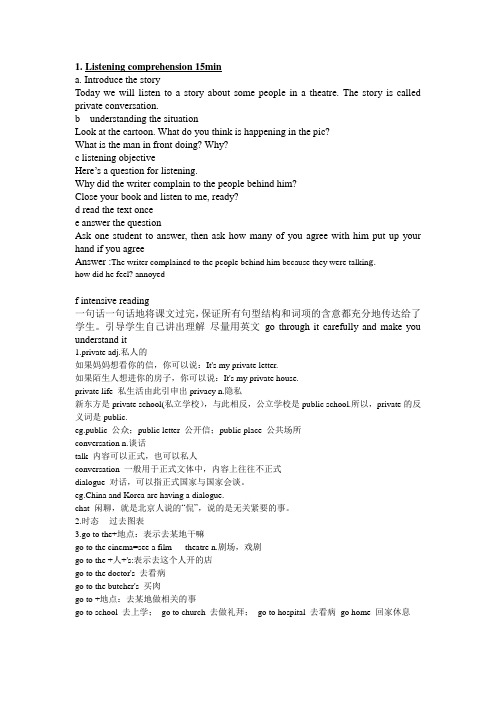
1.Listening comprehension 15mina.Introduce the storyToday we will listen to a story about some people in a theatre. The story is called private conversation.b understanding the situationLook at the cartoon. What do you think is happening in the pic?What is the man in front doing? Why?c listening objectiveHere’s a question for listening.Why did the writer complain to the people behind him?Close your book and listen to me, ready?d read the text oncee answer the questionAsk one student to answer, then ask how many of you agree with him put up your hand if you agreeAnswer :The writer complained to the people behind him because they were talkin g.how did he feel? annoyedf intensive reading一句话一句话地将课文过完,保证所有句型结构和词项的含意都充分地传达给了学生。
引导学生自己讲出理解尽量用英文go through it carefully and make you understand it1.private adj.私人的如果妈妈想看你的信,你可以说:It's my private letter.如果陌生人想进你的房子,你可以说:It's my private house.private life 私生活由此引申出privacy n.隐私新东方是private school(私立学校),与此相反,公立学校是public school.所以,private的反义词是public.eg.public 公众;public letter 公开信;public place 公共场所conversation n.谈话talk 内容可以正式,也可以私人conversation 一般用于正式文体中,内容上往往不正式dialogue 对话,可以指正式国家与国家会谈。
新概念第二课(第一课时)教案(精选五篇)

新概念第二课(第一课时)教案(精选五篇)第一篇:新概念第二课(第一课时)教案新概念第二册第一课《A Private Conversation》教案教案设计设计人:赖老师课题:A Private Conversation 课时:第一课时(40min),新授课(阅读)教学目标:1.熟读课文,掌握课文中的词汇与短语;2.了解在剧院看戏礼仪,培养良好情操。
教学难点:1.回顾与复习一般过去时;2.用英语话概况课文主要内容;3.go to the theatre 与 go to theatre的区别。
教学案例:T(T eacher)Ss(Students)T: Good afternoon, students!Do you like watching movies or plays? 大家喜欢看电影或者戏剧吗?Ss: Yes!T:(To show the posts of the latest movies)T: We call these “movie”.(T o learn the new word)Ss:(T o read after the teacher)T:(To show the posts of the four classical plays in Broadway)We call these “plays”.Ss:(To read after the teacher)T: Where do we watch the movies? Ss: 电影院、剧院T: cinema,theatre Ss:(To read after the teacher)T:(To introduce the Broadway)T: If we speak loudly in the theatre how would the other audiences think of us? 如果我们在剧院里面大声喧哗,周围的观众会怎么样看待你呢?Ss: 生气!会觉得你素质低!T: So everyone knows that the bad manner would bother the others, right? So the word “生气”in English we call “angry”.Ss:(To read after the teacher)T:(To learn and read thenew words and expressions)Ss:(To read after the teacher)T: Before reading our context, let’s think about these questions.The first, where did the writer go last week? The second, why did the writer complain about the people behind him? The third, what did the young man say to the writer? T:(To read the context or play the tape)T:(To ask volunteers to answer the questions)Ss: …… T: 我们想想课文中的第一句go to the theatre是什么意思? Ss: 嗯,应该是“去戏院”的意思。
新概念2教案第一课word.doc
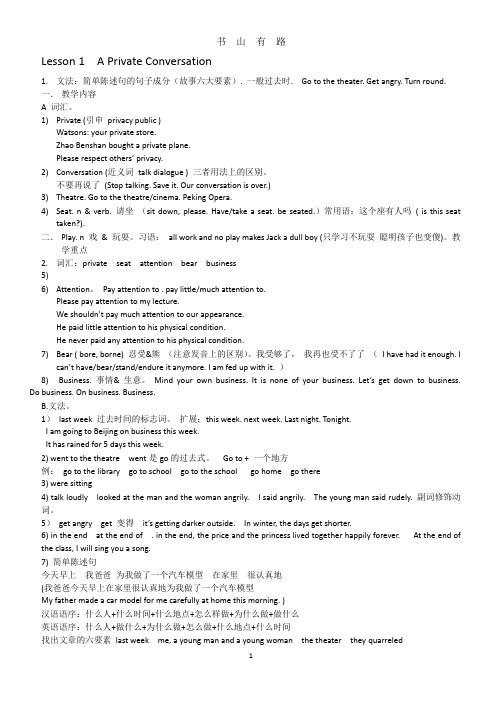
Lesson 1 A Private Conversation1.文法:简单陈述句的句子成分(故事六大要素). 一般过去时. Go to the theater. Get angry. Turn round.一.教学内容A 词汇。
1)Private (引申privacy public )Watsons: your private store.Zhao Benshan bought a private plane.Please respect others’ privacy.2)Conversation (近义词talk dialogue ) 三者用法上的区别。
不要再说了(Stop talking. Save it. Our conversation is over.)3)Theatre. Go to the theatre/cinema. Peking Opera.4)Seat. n & verb. 请坐(sit down, please. Have/take a seat. be seated.)常用语:这个座有人吗( is this seattaken?).二.Play. n 戏& 玩耍。
习语:all work and no play makes Jack a dull boy (只学习不玩耍聪明孩子也变傻)。
教学重点2.词汇:private seat attention bear business5)6)Attention。
Pay attention to . pay little/much attention to.Please pay attention to my lecture.We shouldn’t pay much attention to our appearance.He paid little attention to his physical condition.He never paid any attention to his physical condition.7)Bear ( bore, borne) 忍受&熊(注意发音上的区别)。
新概念英语第二册优秀教案
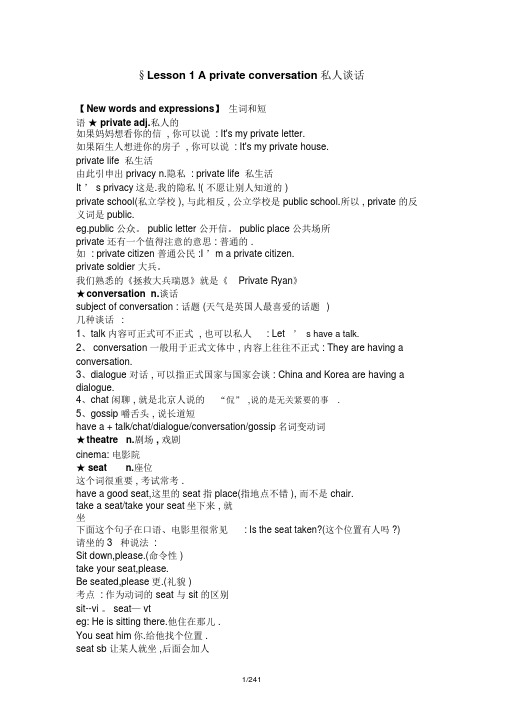
§Lesson 1 A private conversation私人谈话【New words and expressions】生词和短语★ private adj.私人的如果妈妈想看你的信 , 你可以说 : It's my private letter.如果陌生人想进你的房子 , 你可以说 : It's my private house.private life 私生活由此引申出 privacy n.隐私 : private life 私生活It ’ s privacy这是.我的隐私 !( 不愿让别人知道的 )private school(私立学校 ), 与此相反 , 公立学校是 public school.所以 , private 的反义词是 public.eg.public 公众。
public letter 公开信。
public place 公共场所private 还有一个值得注意的意思 : 普通的 .如: private citizen 普通公民 :I ’m a private citizen.private soldier 大兵。
我们熟悉的《拯救大兵瑞恩》就是《Private Ryan》★conversation n.谈话subject of conversation : 话题 (天气是英国人最喜爱的话题)几种谈话:1、talk 内容可正式可不正式 , 也可以私人: Let’ s have a talk.2、 conversation 一般用于正式文体中 , 内容上往往不正式 : They are having a conversation.3、dialogue 对话 , 可以指正式国家与国家会谈 : China and Korea are having a dialogue.4、chat 闲聊 , 就是北京人说的“侃” ,说的是无关紧要的事.5、gossip 嚼舌头 , 说长道短have a + talk/chat/dialogue/conversation/gossip名词变动词★theatre n.剧场 , 戏剧cinema: 电影院★ seat n.座位这个词很重要 , 考试常考 .have a good seat,这里的 seat指 place(指地点不错 ), 而不是 chair.take a seat/take your seat坐下来 , 就坐: Is the seat taken?(这个位置有人吗 ?)下面这个句子在口语、电影里很常见请坐的 3种说法 :Sit down,please.(命令性 )take your seat,please.Be seated,please更.(礼貌 )考点 : 作为动词的 seat 与 sit 的区别sit--vi 。
新概念第二册第一课教案
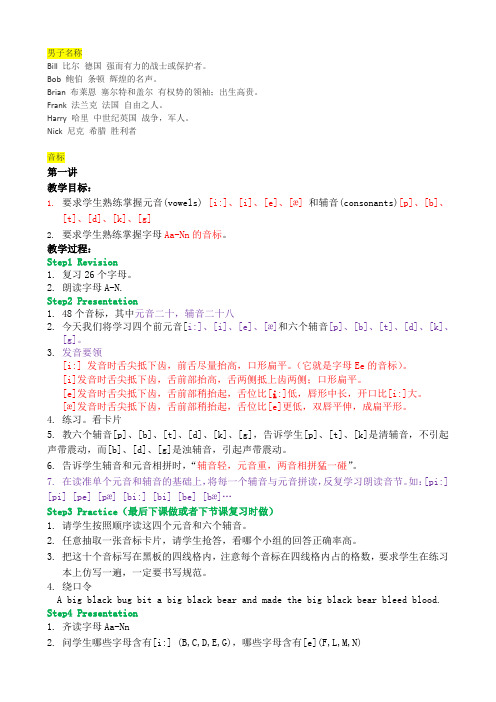
男子名称Bill 比尔德国强而有力的战士或保护者。
Bob 鲍伯条顿辉煌的名声。
Brian 布莱恩塞尔特和盖尔有权势的领袖;出生高贵。
Frank 法兰克法国自由之人。
Harry 哈里中世纪英国战争,军人。
Nick 尼克希腊胜利者音标第一讲教学目标:1.要求学生熟练掌握元音(vowels) [i:]、[i]、[e]、[æ]和辅音(consonants)[p]、[b]、[t]、[d]、[k]、[g]2.要求学生熟练掌握字母Aa-Nn的音标。
教学过程:Step1 Revision1.复习26个字母。
2.朗读字母A-N.Step2 Presentation1.48个音标,其中元音二十,辅音二十八2.今天我们将学习四个前元音[i:]、[i]、[e]、[æ]和六个辅音[p]、[b]、[t]、[d]、[k]、[g]。
3.发音要领[i:] 发音时舌尖抵下齿,前舌尽量抬高,口形扁平。
(它就是字母Ee的音标)。
[i]发音时舌尖抵下齿,舌前部抬高,舌两侧抵上齿两侧;口形扁平。
[e]发音时舌尖抵下齿,舌前部稍抬起,舌位比[i:]低,唇形中长,开口比[i:]大。
[æ]发音时舌尖抵下齿,舌前部稍抬起,舌位比[e]更低,双唇平伸,成扁平形。
4. 练习。
看卡片5. 教六个辅音[p]、[b]、[t]、[d]、[k]、[g],告诉学生[p]、[t]、[k]是清辅音,不引起声带震动,而[b]、[d]、[g]是浊辅音,引起声带震动。
6. 告诉学生辅音和元音相拼时,“辅音轻,元音重,两音相拼猛一碰”。
7. 在读准单个元音和辅音的基础上,将每一个辅音与元音拼读,反复学习朗读音节。
如:[pi:] [pi] [pe] [pæ] [bi:] [bi] [be] [bæ]…Step3 Practice(最后下课做或者下节课复习时做)1.请学生按照顺序读这四个元音和六个辅音。
2.任意抽取一张音标卡片,请学生抢答,看哪个小组的回答正确率高。
新概念第二册Lesson-1教案

Lesson 1A private conversation 私人谈话生词和短语★private adj.私人的it's my private letter/house ;private school:私立学校public:公众的,公开的public school ; public letter 公开信;public place :公共场所privacy:隐私 it's a privacy. adj.《Private Ryan》 private soldier:大兵private citizen 普通公民 private life:私生活★conversation n.谈话subject of conversation:话题 I have a conversation with sb. talk.可以正式,也可以私人的conversation. 比较正式一些let's have a talkThey are having a conversation.conversation 用的时候比talk正式,意思上往往不非常正式. talk:可正式可不正式dialogue:对话China and Korea are having a dialogue. 正式chat: 闲聊gossip:嚼舌头have a + talk/chat/dialogue/conversation/gossip 名词变动词动词:converse with sb;talk with/to sb talk about ;say(vt 说的内容),say sth, he said nothing ;speak(vt 讲语言) (vi 说话,谈话,speak to sb)speech n. make a speech;chat 聊天(talk friendly we had a long chat about old times);discuss (v 有着严肃目的的讨论 discussion);gossip(说闲话,嚼舌头 he is nothing but gossip)★theatre (口语:play house) n.剧场,戏剧(in US :theater UK:metre meter centre-center)Go to the theatre /go to the movies/go to the cinema/ go to the filmTheatre goer 、play goer戏迷cinema: 电影院★seat n.座位have a good seat(place)take a seat : 座下来,就座take your seat/take a seatIs the seat taken? 这个座位有人吗?no/yessit sit down ,pleaseseat take your seat,please、have a seat, pleasebe seated,please 更为礼貌seat是及物动词,后面有宾语sit是不及物动词,后面不加宾语seat后面会加人; seat sb; seat him; seat:让某人就座sit he is sitting there.you seat him;seat 座位:is this seat taken? 这儿能做吗seatbelt 安全带 in the driver’s seat=in the leader’s seat back-seat driver 爱指手画脚的人seat 席位,在国会里 win a seat, lose a seatvt. 安排。
新概念英语第二册第一课教案
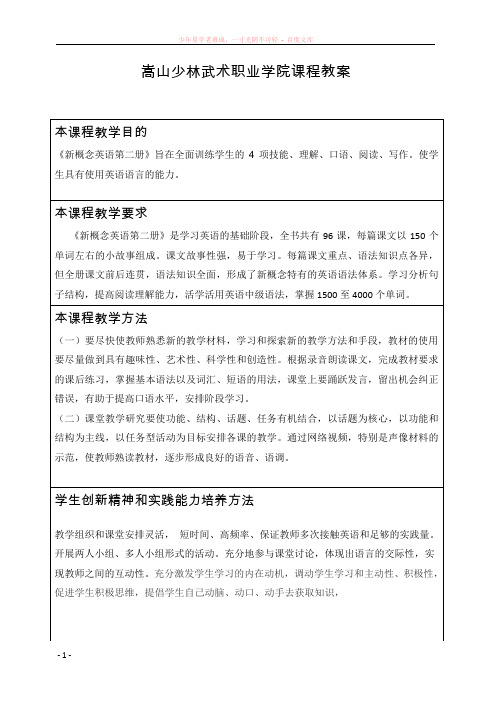
18、private私人的,反义词是public公开的
举例:private letter私人信件- public letter公开信
private school私立学校- public school公立学校
19、conversation一般用于正式文体中,但谈话的内容往往不很正式。
爸爸送给我一辆自行车。Father gave me a bike.
他让我笑了。He made me laughing.
汉语的语序:什么人+什么时间+什么地点+怎样做+为什么做+做什么
例句:我爸爸今天早上在家里很认真地为我做了一个汽车模型。
英语的语序:什么人+做什么+为什么做+怎样做+什么地点+什么时间
12、in the end = at last到最后。in the end of …在…的末尾,可以指时间也可以指空间。
13、I could not bear it!我实在受不了了!这是一句非常有用的习惯用语。
bear = stand忍受、容忍。it代指这整件事。
14、again再一次,又一次。例句:I’m sorry. Can you say it again? I can’t follow you.
10、I looked at the man and the woman angrily.这里的angrily是副词,修饰look at这个动作。
see看见,及物动词,强调结果,see sb./sth.
look看,不及物动词,强调动作,look at sb./sth.
11、They did not pay any attention.这句话之前可以加上连词But。这是个省略句,省略了to me。
新概念英语第二册教案
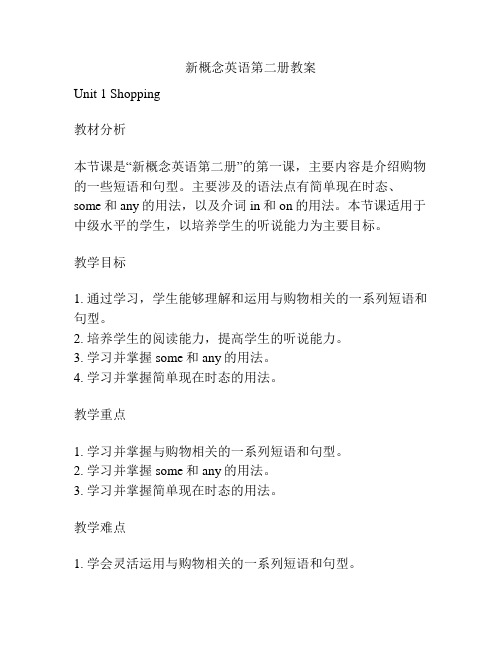
新概念英语第二册教案Unit 1 Shopping教材分析本节课是“新概念英语第二册”的第一课,主要内容是介绍购物的一些短语和句型。
主要涉及的语法点有简单现在时态、some和any的用法,以及介词in和on的用法。
本节课适用于中级水平的学生,以培养学生的听说能力为主要目标。
教学目标1. 通过学习,学生能够理解和运用与购物相关的一系列短语和句型。
2. 培养学生的阅读能力,提高学生的听说能力。
3. 学习并掌握some和any的用法。
4. 学习并掌握简单现在时态的用法。
教学重点1. 学习并掌握与购物相关的一系列短语和句型。
2. 学习并掌握some和any的用法。
3. 学习并掌握简单现在时态的用法。
教学难点1. 学会灵活运用与购物相关的一系列短语和句型。
2. 掌握some和any的用法。
教学准备1. 教师准备:教材、教师课件、多媒体设备。
2. 学生准备:课本、笔记本。
教学过程Step 1: Lead-in1. Greet the students and ask them some questions to warm up, such as:- Do you like shopping?- Where do you usually go shopping?- What do you usually buy when you go shopping?2. Show some pictures of shopping malls and supermarkets on the screen and ask the students:- Have you been to these places before?- Can you name some things that you can buy in a supermarket/shopping mall?Step 2: Presentation1. Present new vocabulary related to shopping by using flashcards or pictures on the screen.2. Teach the students some useful phrases and sentence structures related to shopping, such as:- Can I help you?- How much is it?- I'm just looking, thanks.- I would like to buy...3. Practice the new phrases and sentence structures with the students through role-play or group activities.Step 3: Grammar focus1. Teach the students the difference between some and any.2. Create some exercises to practice the use of some and any.3. Have the students complete the exercises individually or in pairs. Step 4: Reading comprehension1. Have the students read the dialogue on page 2 of the textbook.2. Discuss the questions that follow the dialogue, such as:- What is the woman looking for in the supermarket?- How much is the fish?- Does the woman buy the fish?3. Have the students discuss their answers in pairs or small groups. Step 5: Listening comprehension1. Play the audio recording of the dialogue.2. Have the students listen and answer the questions orally or in writing.Step 6: Role-play and practice1. Divide the students into pairs or small groups.2. Give each group a scenario, such as buying clothes, groceries, or electronics.3. Have the students role-play the scenarios and use the phrases and sentence structures they have learned.Step 7: Summary and homework1. Summarize the key points of the lesson.2. Assign homework, such as completing the exercises in the workbook or practicing the dialogue in pairs.教学反思本节课的教学目标主要是使学生掌握与购物相关的一些短语和句型,培养学生的听说能力。
- 1、下载文档前请自行甄别文档内容的完整性,平台不提供额外的编辑、内容补充、找答案等附加服务。
- 2、"仅部分预览"的文档,不可在线预览部分如存在完整性等问题,可反馈申请退款(可完整预览的文档不适用该条件!)。
- 3、如文档侵犯您的权益,请联系客服反馈,我们会尽快为您处理(人工客服工作时间:9:00-18:30)。
一.课题:Lesson 1 A private conversation 私人谈话二.计划的授课时间:50分钟三.教学流程1.组织课堂:Hello,everybody.What a nice day!2.导入:Today we will talk about one topic---private conversation.(写题目Lesson 1 A private conversation;跟读private conversation,简单讲解词义---私人谈话)大家经常去电影院看电影吗?喜欢什么类型的电影?在电影院里遇见过不看电影、大声说话或者看电影看得太入迷、边看边讨论剧情的人吗?(与学员互动)今天,我们要学习的是一个发生在戏院里的事。
主人公兴致勃勃地到戏院看戏,但遇见了一件让他很生气的事,那到底是什么事呢?3.新知识讲解:First listen to the tape twice and I will ask you one question---what do you learn from the passage?(listening to the tape twice)Ok, wo would like to answer the question? what do you learn from the passage?(与学员互动)好,那我们跟随作者的脚步,来看看他们都具体说了什么?follow me please!(Read the passage following me and read it by the students themselves)生词与短语讲解:1.private/`praivit/adj.○1私人的,秘密的a private conversation/letter 私人交谈/信函Eg: they were sharing a private joke.他们讲着外人听不懂的笑话。
private eye 私眼[私家侦探的别称,侦探小说和电影里不可少的角色。
原称private investigator,取后一字首一字母i(读如eye),造成新词private eye.]---拓展学员知识○2私立的,私营的,民营的private companies、enterprise/schools私营公司、企业/私立学校○3名词形式:privacy n.隐私,私密2.conversation n.(非正式)交谈,谈话○1to get into (a---AmE) conversation with sb.开始与某人攀谈Eg: Don was deep in conversation with the girl on his right.唐与他右边的女孩在深入交谈。
○2conversational adj.用于交谈的,口语的conversationalist n.健谈的人,能聊的人3.theatre n.剧场,戏院(AmE theater)---go to the theatre去看戏Broadway theatres 百老汇的剧院[百老汇(Broadway),原意为“宽阔的街”,指纽约市的一条长街。
百老汇是西方戏剧行业的一个巅峰代表,在戏剧和剧场这个行业代表着最高级别的艺术成就和商业成就。
著名的好莱坞音乐故事片《音乐之声》(Sound of music)的女主角朱莉亚•安德鲁丝就是从百老汇的同名音乐剧中的表演开始,被导演发现后走上银幕,成为美国60年代的银幕偶像。
最为著名的音乐剧有“猫”(Cats)、“芝加哥”(Chicago)、“歌剧魅影”(The Phantom of Opera)等]---拓展学员知识4.seat○1n.座位Eg: a.Please take a seat (=sit down). 请坐。
b.He put his shopping on the seat behind him.他把买的东西放在身后的座位上。
n.(议会,理事会,委员会等的)席位to win/lose a seat(=in an election)(在选举中)赢得/失去一个席位4.play○1n.戏剧,剧本to put on(=perform) a play 演出戏剧a play by Shakespeare 一出莎士比亚的戏剧[英国文艺复兴时期杰出的戏剧家和诗人,代表作有四大悲剧《哈姆雷特》”Hamlet”,《奥赛罗》”Othello”,《李尔王》”King Lear”,《麦克白》”Macbeth”,喜剧《威尼斯商人》”Merchant of Venice”等。
还写过154首十四行诗,三或四首长诗。
他是“英国戏剧之父”,马克思称他为“人类最伟大的天才之一”。
被赋予了“人类文学奥林匹斯山上的宙斯”。
]---拓展学员知识○2v.a.玩耍,游戏,玩乐b.参加比赛;(同某人)比赛to play football/chess/cards 踢足球/下棋/玩纸牌c.弹拨,吹奏(乐器),演奏to play the piano/violin/flute弹钢琴/拉小提琴/吹长笛5.loudly adv. 大声地loud adj. 说话太大声的,吵闹的6.angry○1adj.---get angry 生气be angry(with sb.)(about sth.)Eg:a. Please don’t be angry with me. It wasn’t my fault.请别冲着我发脾气,不是我的错。
b.The passengers grew angry about the delay.延误使乘客气愤起来。
○2angrily adv.生气地7.attention n.注意---pay attention(to)注意Eg: Please pay attention to what I am saying!请注意听我讲的话!attract/draw/catch/call attention 引起……的注意Eg:She tried to attarct the waiter’s attention.她试图引起服务员的注意。
8.bear(bore,borne注意变化和发音)v.容忍---I could not bear it.我无法容忍一般与can/could连于用疑问句及否定句中bear to do/doing(通常情况)Eg:How can you bear living in this place?你怎么能受得了住在这个地方?9.business n.事---It’s none of your business.不关你的事。
10.rudely adv.无礼地,粗鲁地rude adj.无礼的,粗鲁的rude (to sb.)(about sth.)(to do sth.)Eg:the man was downright rude to us.这个家伙对我们无礼至极。
She was very rude about my driving.她对我的开车方法横加指责。
It’s rude to speak when you’re eating.吃东西的时候说话不礼貌。
课文讲解:Last week I went to the theatre. 句首的“Last week”点明叙述的事情发生的时间是上星期,因此整篇课文的时态基本上应是过去时。
文章的译文的简单介绍……相信大家对这篇课文也有了细致的了解。
花钱买票到戏院看戏原来是一件多惬意的事啊!却因为碰上两个不懂礼貌的家伙,一场好戏就这么泡汤了,回头责备而遭来对方的毫不客气的一句“it’s none of your business,it is a private conversation!”真是好气又好笑!4.课文操练:做练习P15,让学员回答并纠正错误。
文章部分就到这儿,下面进入到我们的语法时间!Grammer Time!今天我要讲的是简单陈述句的语序(word order in simple statements)为了直观易懂,我为大家画一个表格(画一个空表格)○1主语一般为名词、代词或名词短语,通常位于动词之前。
(如I, the children)○2动词必须与主语“一致”,所以主语决定动词的单复数形式(如I am, you are, he has)○3宾语一般为名词、代词或名词短语。
在主动句中,宾语一般位于动词之后。
一个句子不总需要有宾语。
○4状语的位置比较灵活。
状语分成方式状语、地点状语和时间状语。
当一个句子里有一种以上的副词时,地点副词的一般位置是在方式副词之后、时间副词之前。
举五个例子把表格填充完整。
(如下)4.语法操练:下面,我们来实践一下,看你是否真正理解了简单陈述句的语序。
把书翻到page14,exerciseB.4\8\11\13\16.让学员回答并纠正错误。
5.总结:今天,我们学习了第一课 a private conversation私人谈话这个有趣的故事。
掌握了一些单词和短语,其中angry with sb.about sth.\pay attention to\I could not bear it\none of your business是非常重要的词组和习惯用法。
还学习了语法知识,简单陈述句的语序,知道了什么是主语、动词、宾语、状语,其中状语包括方式、地点、时间状语。
6.可操作性作业:希望大家课后能够继续把书上的习题完成,把今天所学过的知识运用到日常生活中去。
因为语言就是用来表达的,而我们的宗旨就是SUNBO,study useful native brilliant Oral,祝愿大家能够在@#¥学到最实用地道漂亮的口语!Thank you, everyone! See you next time!。
